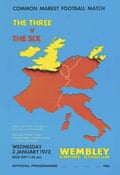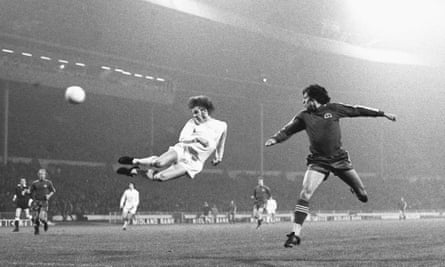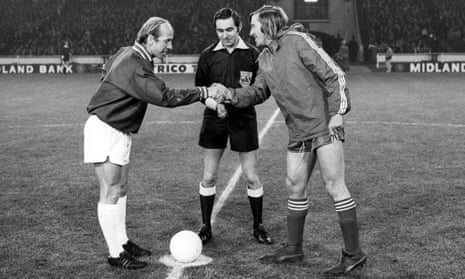Ted Heath may not have been the most charismatic prime minister in the United Kingdom’s long rich history, but at least the man knew how to throw a party. When he took the UK into the European Economic Community in January 1973, he celebrated the occasion by spending a quarter of a million of your sterling pounds on the Fanfare for Europe, an 11-day festival that included, among more than 150 other cultural high-points, concerts by Slade, the Kinks, Status Quo, the Chieftains, and the Orchestre de Paris conducted by Georg Solti. Fast forward 47 years, and what does Boris Johnson, self-styled natural-born showman, have lined up for the similarly epochal Brexit Day? Not a great deal, by the looks of it. A new interpretation of John Cage’s 4’33” by the avant-garde campanologist Mark “Hot Mallets” Francois isn’t exactly scratching our itch.
Yes, the past is a different country, and they have better trade links there. Fanfare ’73 was a wide-ranging celebration of a new cultural and economic union with our friends on the continent: Fonteyn and Nureyev in Swan Lake at Covent Garden; Albert Finney performing the work of Samuel Beckett; a symposium on visual language by Jacques Tati. There were exhibitions of French impressionism and Italian futurism, a display of contemporary Scandi design, and a grand market of the latest European art. (The market had so many fancy pieces on sale, the taxpayer was forced to foot a £60,000 insurance bill. An eye-watering premium, until you remember it was only six and a half years since the World Cup, at which England’s top security professionals and the Metropolitan Police had to be bailed out by Pickles and his inquisitive wet nose. Worth every penny for peace of mind alone.)
Not everything was absurdly highbrow. A night of comedy at the Royal Albert Hall with Bruce Forsyth, Dick Emery and Leslie Crowther. A vintage car rally from London to Brussels led by Lord Montagu of Beaulieu. A beauty contest on pre-Me-Too ITV, won by Sylvia Kristel, later the star of special-interest motion flick Emmanuelle. Britain’s third television channel also transmitted – bear with us, we’re getting very close to the bit about the football – a special edition of popular talent show Opportunity Knocks! featuring acts from some nations of the newly enlarged EEC.
Some, you’ll have noticed, but not all. German, Danish and Luxembourgian television declined to take part, appalled at the low quality of the programme. “Words failed them,” reported some poor bugger from the Foreign Office who had been roped into tense negotiations with unctuous host and media grifter Hughie Green. They also didn’t care for Green’s oleaginous delivery ... and they meant that most sincerely. Their loss, though. No less a superstar than Johan Cruyff (!!!) was coerced into appearing on the programme. In a brief interview, Cruyff reassured viewers whiling away the minutes until Coronation Street that British football would not be adversely affected by the UK’s membership of the EEC. A performance of his 1969 hit single Oei Oei Oei, Dat Was Me Weer Een Loei, a woozy carouse o’clock bierkeller stomp that wouldn’t have sounded out of place on the first side of Scott 2, was presumably considered too outre for 6.45pm Monday on Thames.

Cruyff wasn’t the only continental soccer star shipped over the briny to join in the celebrations. The Common Market Match at Wembley pitted representatives of the Three – the UK was joining the EEC along with the Republic of Ireland and Denmark – against players from the Six, the founder members Belgium, France, Italy, Luxembourg, the Netherlands and West Germany. Sir Alf Ramsey took charge of the Three, while the man he bested at the 1966 World Cup final, Helmut Schön, was put in control of the Six.
All nations supplied at least one player, except Luxembourg and Wales. The latter’s snub is unlikely to have been a prime factor in the country’s decision to vote leave at the 2016 referendum, surely ... but then some Welsh fans still hold a grudge against Joe Jordan, so you never know. It was a star-studded affair. The Six XI positively dripped with exoticism: Franz Beckenbauer, Günter Netzer, Gerd Müller, Johan Neeskens, Marius Trésor, Dino Zoff, Ruud Krol. But the hosts weren’t too shabby, either: Bobby Moore, Colin Bell, Alan Ball, Peter Lorimer, Johnny Giles. Moore had been expected to captain, but the armband was tossed instead to Bobby Charlton, a conciliatory gesture, plans for a Wembley benefit for the living legend having been cancelled to make way for this Fanfare fixture.

At 35 years of age, Charlton was well over the brow of the hill. He hadn’t played for England since Mexico 70, and would leave Manchester United in April. Not much was expected of him so, well, you know how these stories usually pan out.
The Three sported English white, a sartorial choice that would have surely placated Sir Alf, who signally body-swerved all chances to talk up the new landscape of continental cooperation in the pre-match interviews. “All big Wembley occasions should be cherished,” was his pointed take. The Six sported EEC blue. Nothing much happened in the first half, other than on the half-hour, when the Six captain Netzer insouciantly magic-wanded a 30-yard free-kick around the outside of a two-man wall and off the right-hand post. Pat Jennings was never getting there, rooted to the spot in admiration.
Three minutes into the second half, the old boy took charge. Regally gliding down the left, slipped clear by Ball, Charlton whipped a cross at medium height to the near post. Henning Jensen of Denmark – later to win league titles with Borussia Mönchengladbach, Real Madrid and Ajax – met it with a cute diving header, angling the ball into the bottom right, giving the future World Cup winner Zoff no chance. Seeing you asked, Jensen’s aerial contortions register a perfect 10 on our patented Keith Houchen-o-meter.

Soon after, Charlton drifted down the left again, standing one up at the far stick this time. Bell planted his header wide from close range. On the hour, Charlton’s blocked shot from the edge of the D fell to Lorimer, who sent a low heatseeker twanging off the same post Netzer hit. Then with 70 minutes on the clock, a satisfyingly all-star cast were involved in the clincher. Giles, Emlyn Hughes and Charlton combined to win a corner out on the right. Lorimer hit the set piece deep. Bell looped it back in from the left. Ball headed down, teeing up Colin Stein to sweep home from close range.
The Six offered little resistance – the closest they came to scoring in the second half was when Bell accidentally sent a header looping backwards off his own crossbar – and so the 36,500 crowd went home happy enough. Which is not to say those inside an unusually quiet Wembley, one third full, had been particularly enthused or engaged in the normal partisan style: the biggest cheer of the night came when the PA announced that Norwich City had beaten Chelsea in the semi-final of the League Cup.
So the last notes of Heath’s fanfare were diminuendo. Demand had been overestimated, tickets undersold, and an overall deficit of £25,000 was quietly reported. Meanwhile the Common Market Match was quickly forgotten: Six and Three still resonate in Wembley history, but only because of what Hungary did there 20 years previously. Maybe Johnson is on to something by doing nowt.

Comments (…)
Sign in or create your Guardian account to join the discussion